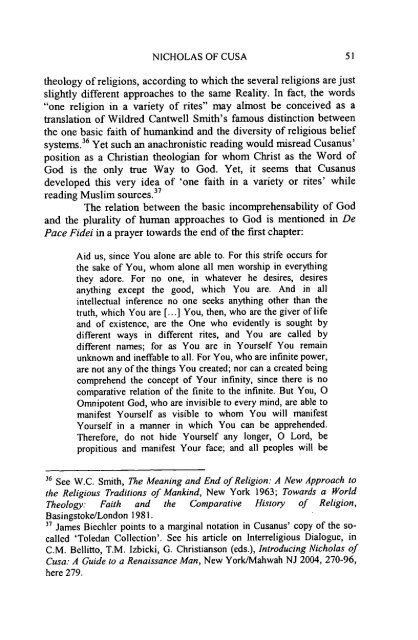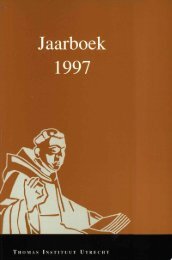Jaarboek Thomas Instituut 2006 - Thomas Instituut te Utrecht
Jaarboek Thomas Instituut 2006 - Thomas Instituut te Utrecht
Jaarboek Thomas Instituut 2006 - Thomas Instituut te Utrecht
You also want an ePaper? Increase the reach of your titles
YUMPU automatically turns print PDFs into web optimized ePapers that Google loves.
NICHOLAS OF CUSA 51<br />
theology of religions, according to which the several religions are just<br />
slightly different approaches to the same Reality. In fact, the words<br />
"one religion in a variety of ri<strong>te</strong>s" may almost be conceived as a<br />
translation of Wildred Cantwell Smith's famous distinction between<br />
the one basic faith of humankind and the diversity of religious belief<br />
sys<strong>te</strong>ms." Yet such an anachronistic reading would misread Cusanus'<br />
position as a Christian theologian for whom Christ as the Word of<br />
God is the only true Way to God. Yet, it seems that Cusanus<br />
developed this very idea of 'one faith in a variety or ri<strong>te</strong>s' while<br />
reading Muslim sources."<br />
The relation between the basic incomprehensability of God<br />
and the plurality of human approaches to God is mentioned in De<br />
Pace Fidei in a prayer towards the end of the first chap<strong>te</strong>r:<br />
Aid us, since You alone are able to. For this strife occurs for<br />
the sake of You, whom alone all men worship in everything<br />
they adore. For no one, in wha<strong>te</strong>ver he desires, desires<br />
anything except the good, which You are. And in all<br />
in<strong>te</strong>llectual inference no one seeks anything other than the<br />
truth, which You are [... ] You, then, who are the giver of life<br />
and of exis<strong>te</strong>nce, are the One who evidently is sought by<br />
different ways in different ri<strong>te</strong>s, and You are called by<br />
different names; for as You are in Yourself You remain<br />
unknown and ineffable to all. For You, who are infini<strong>te</strong> power,<br />
are not any of the things You crea<strong>te</strong>d; nor can a crea<strong>te</strong>d being<br />
comprehend the concept of Your infinity, since there is no<br />
comparative relation of the fini<strong>te</strong> to the infini<strong>te</strong>. But You, 0<br />
Omnipo<strong>te</strong>nt God, who are invisible to every mind, are able to<br />
manifest Yourself as visible to whom You will manifest<br />
Yourself in a manner in which You can be apprehended.<br />
Therefore, do not hide Yourself any longer, 0 Lord, be<br />
propitious and manifest Your face; and all peoples will be<br />
36 See W.C. Smith, The Meaning and End of Religion: A New Approach to<br />
the Religious Traditions of Mankind, New York 1963; Towards a World<br />
Theology: Faith and the Comparative History of Religion,<br />
Basingstoke/London 1981.<br />
37 James Biechler points to a marginal notation in Cusanus' copy of the socalled<br />
'Toledan Collection'. See his article on In<strong>te</strong>rreligious Dialogue, in<br />
C.M. Bellitto, T.M. Izbicki, G. Christianson (eds.), Introducing Nicholas of<br />
Cusa: A Guide to a Renaissance Man, New YorklMahwah NJ 2004,270-96,<br />
here 279.








